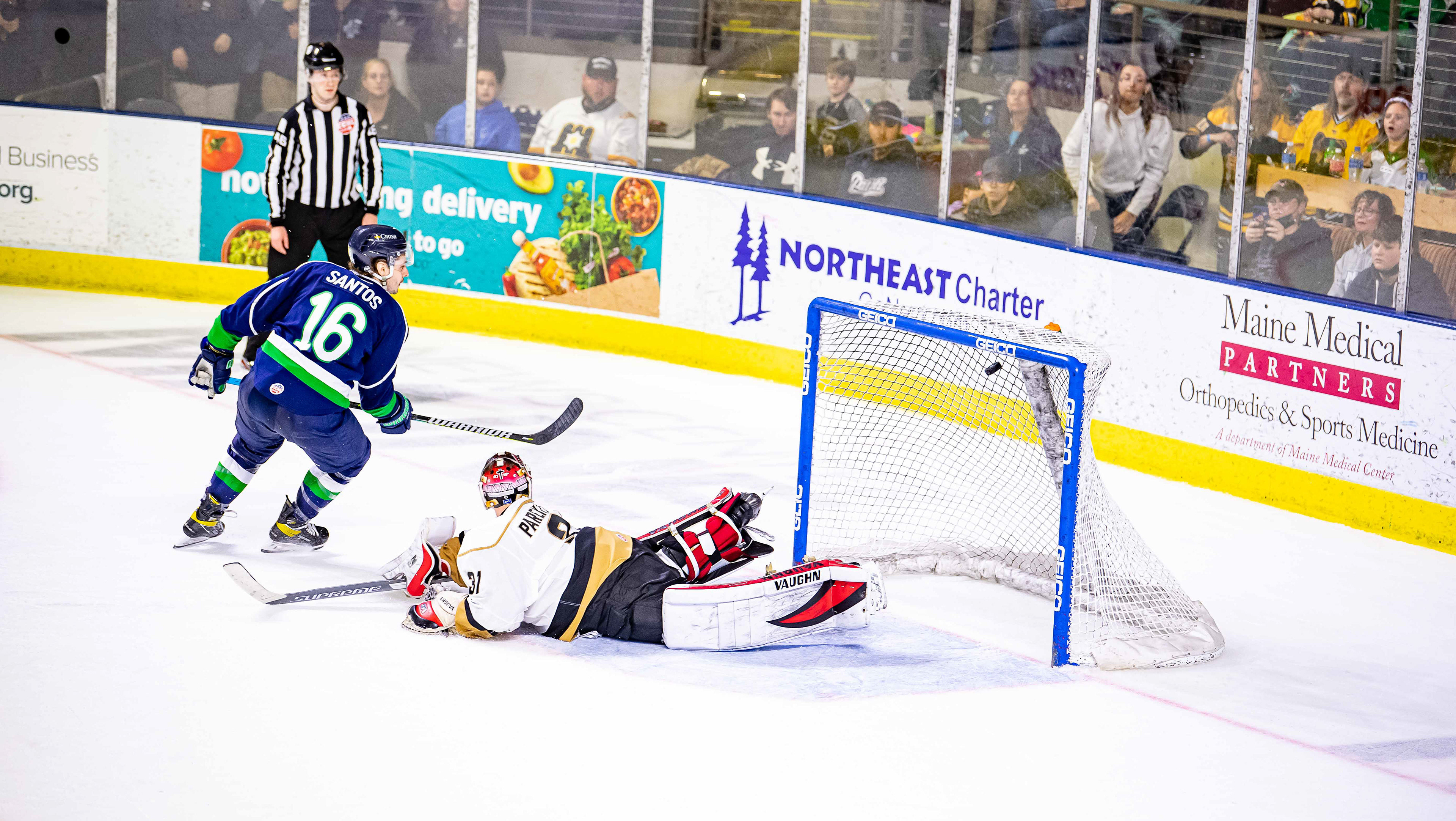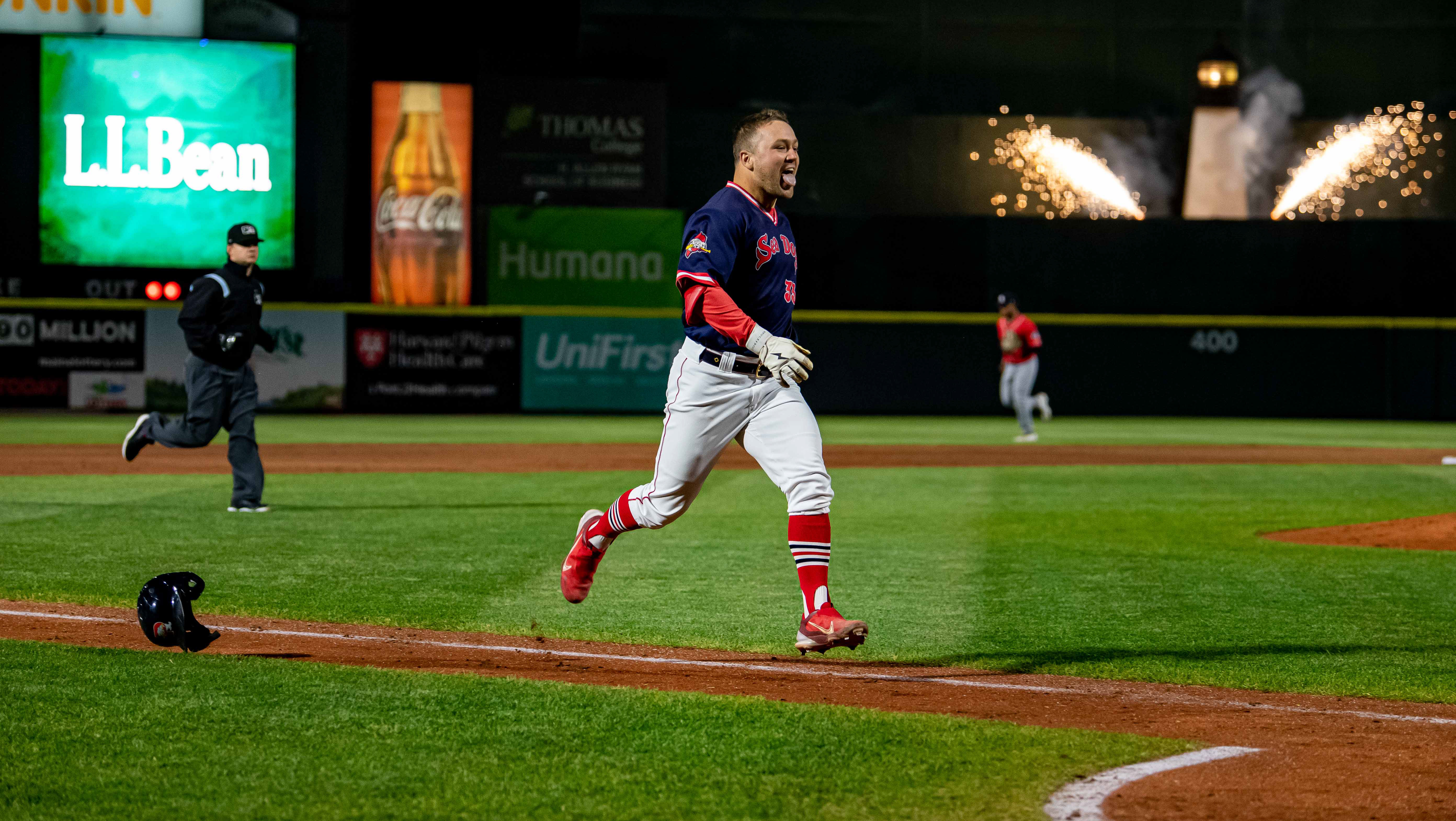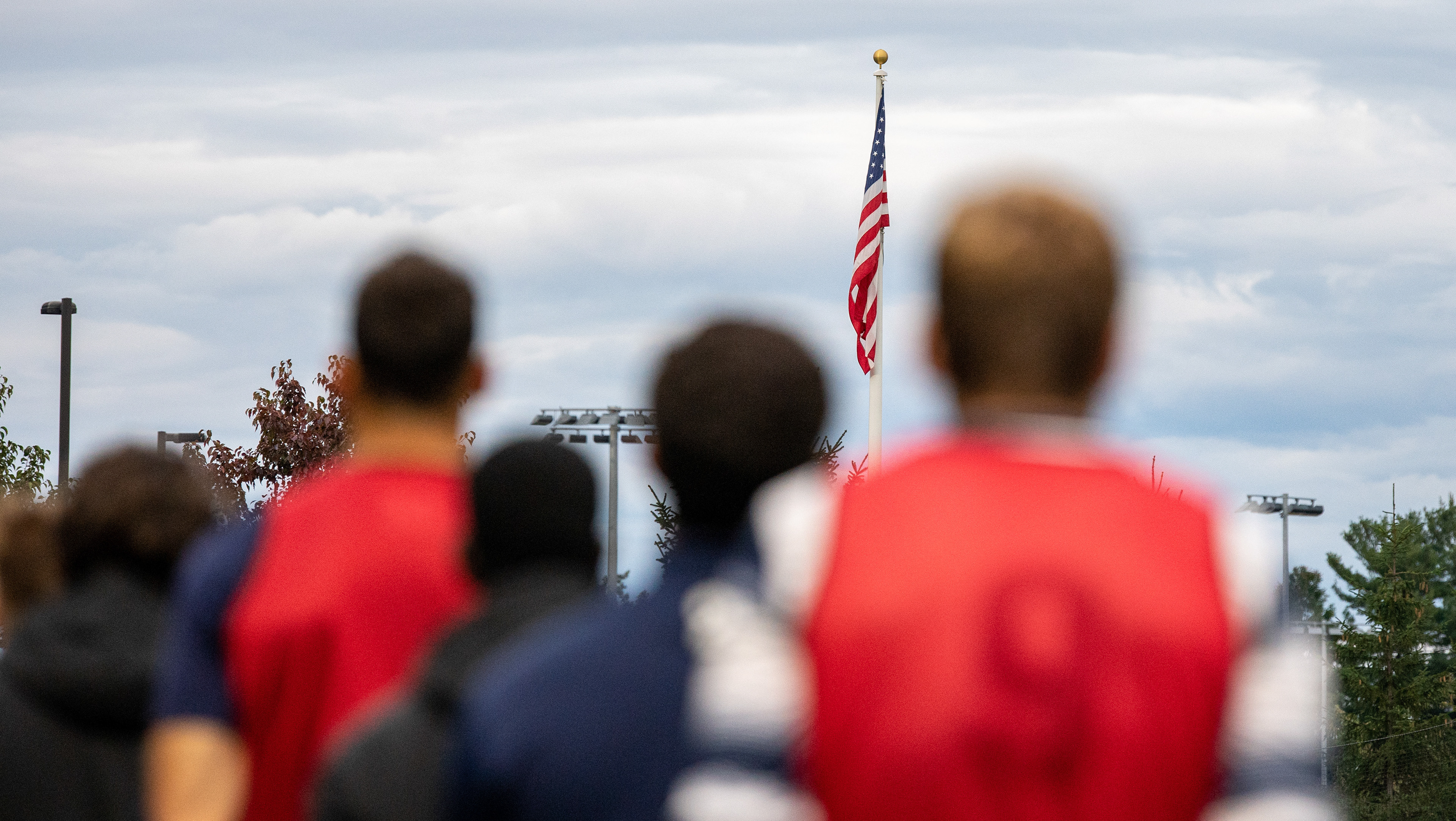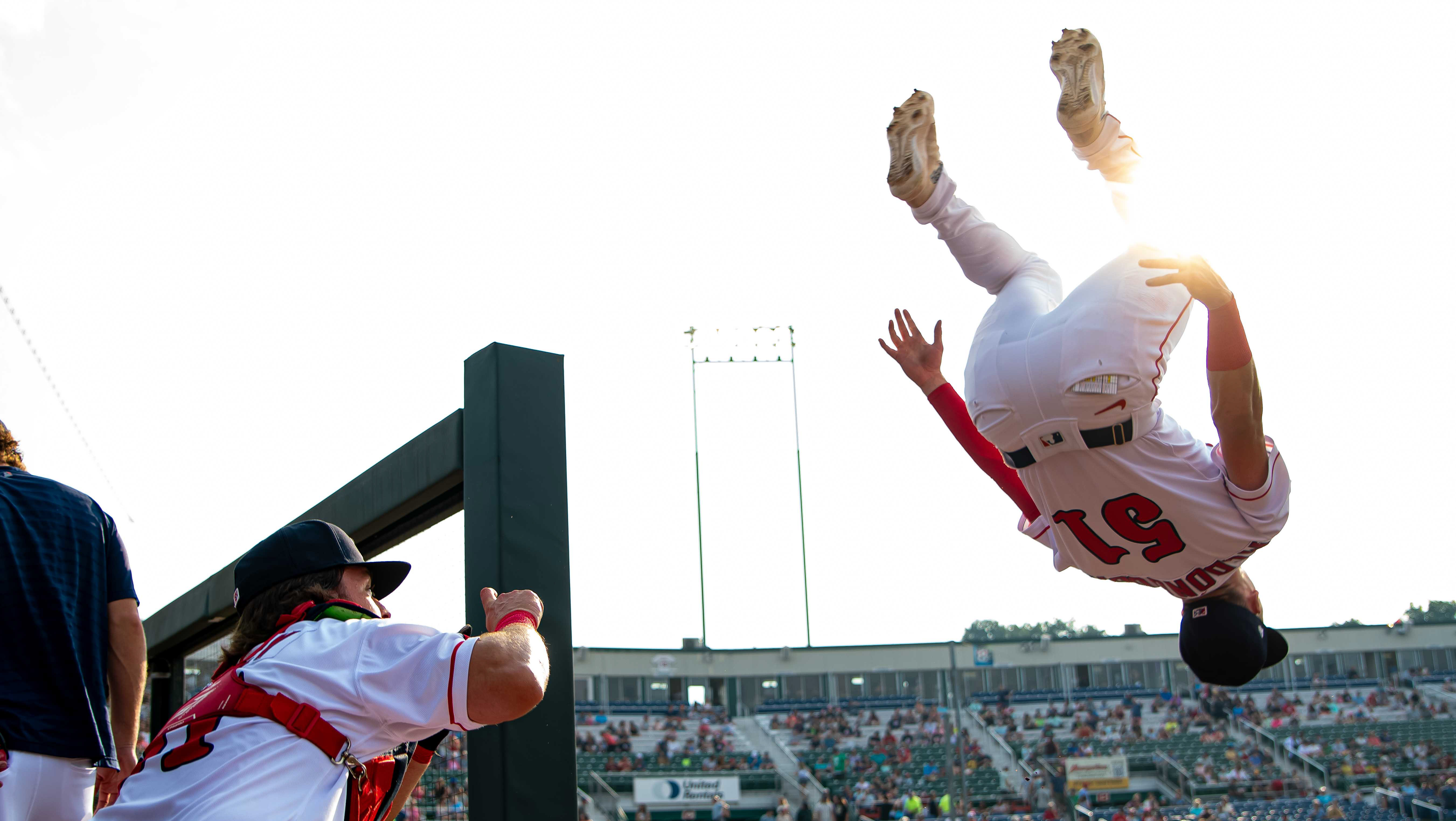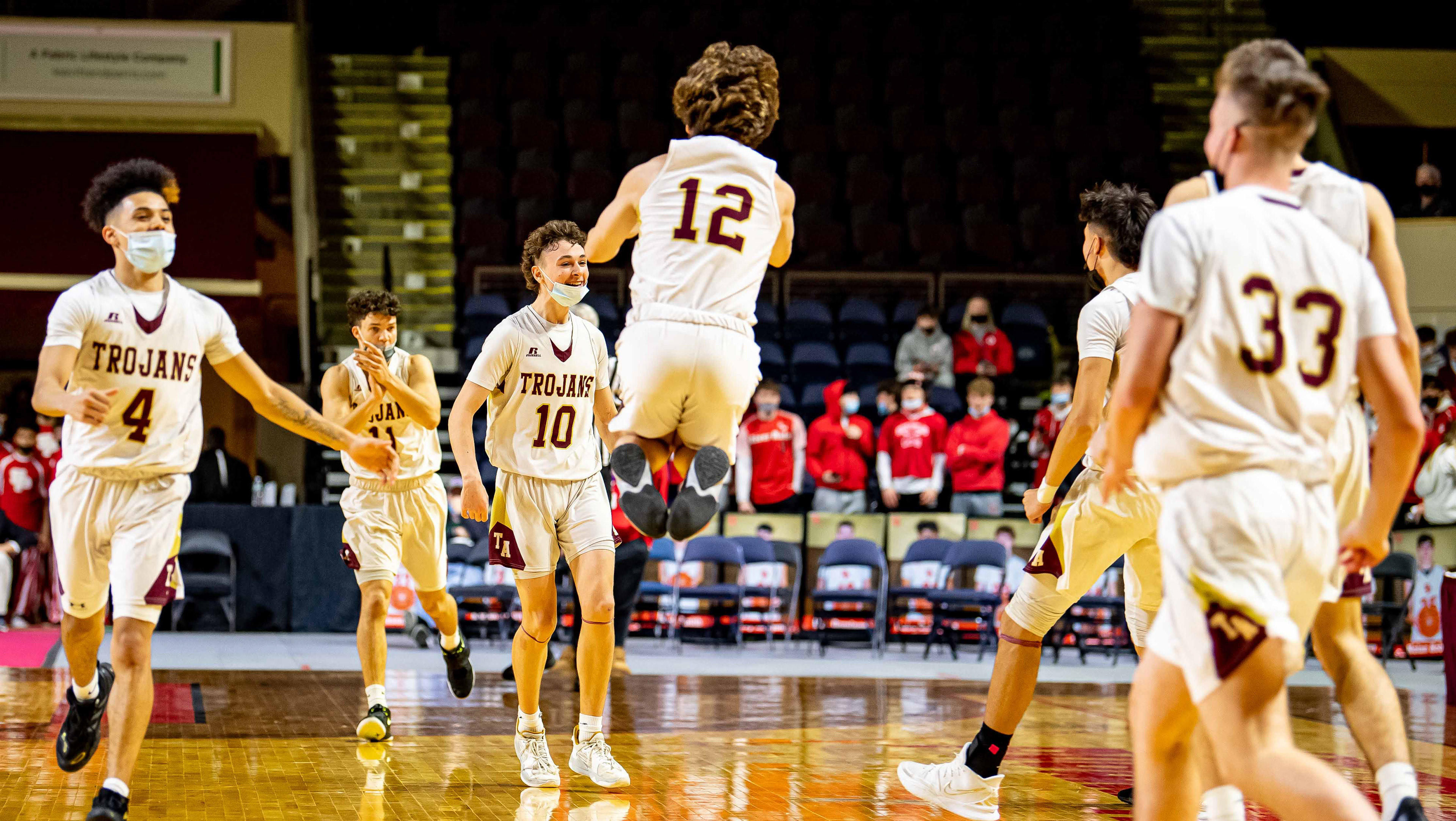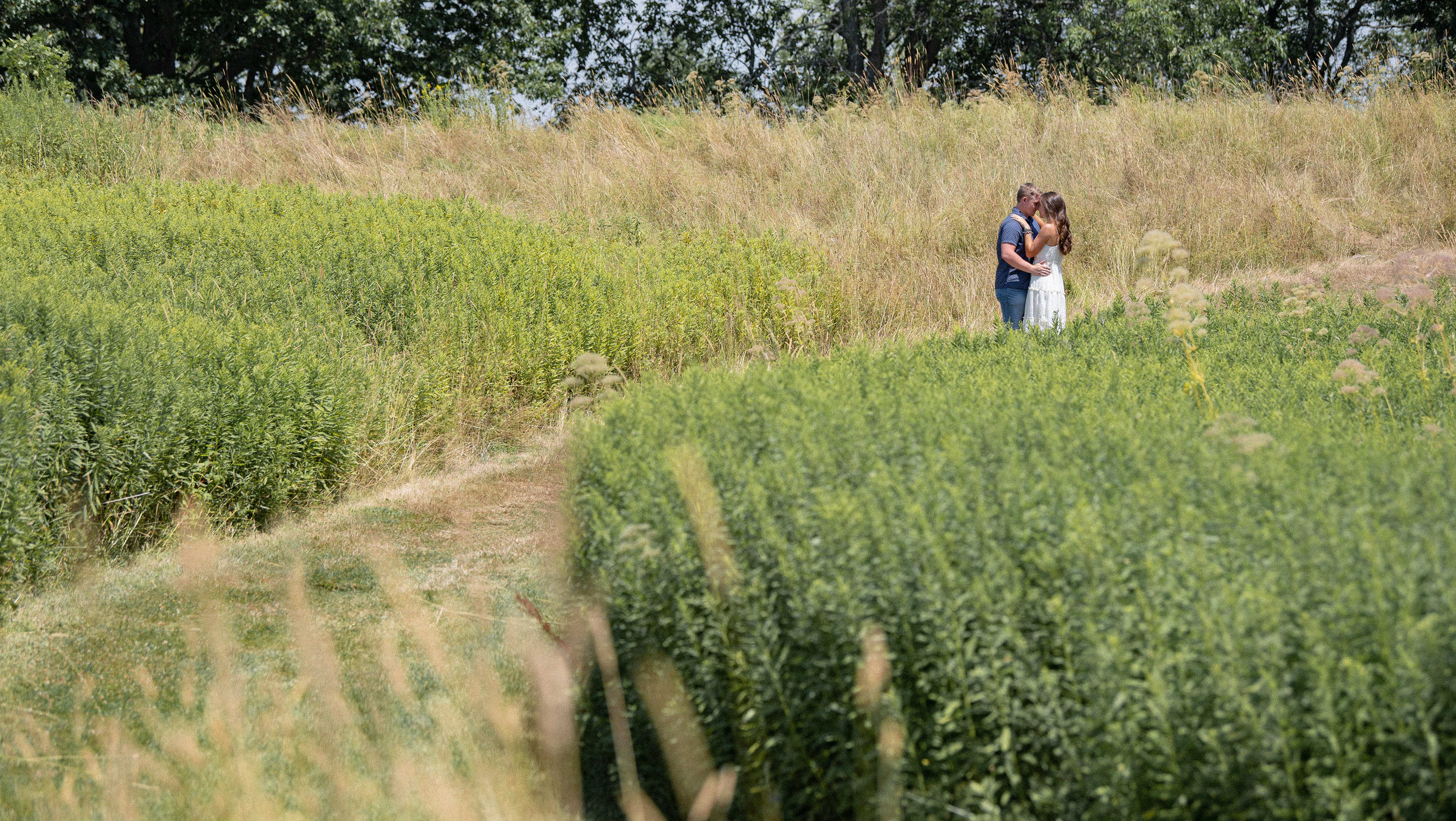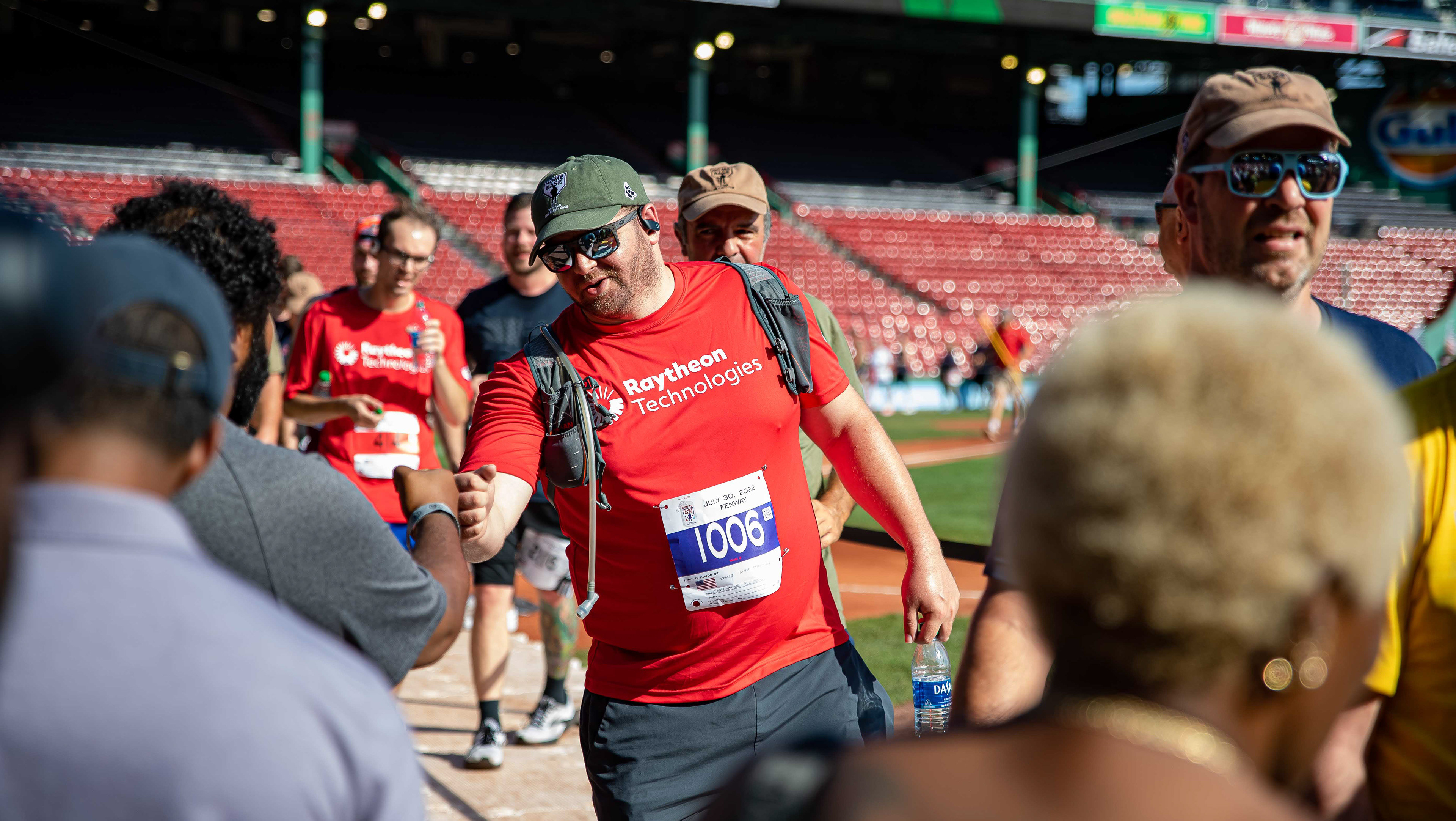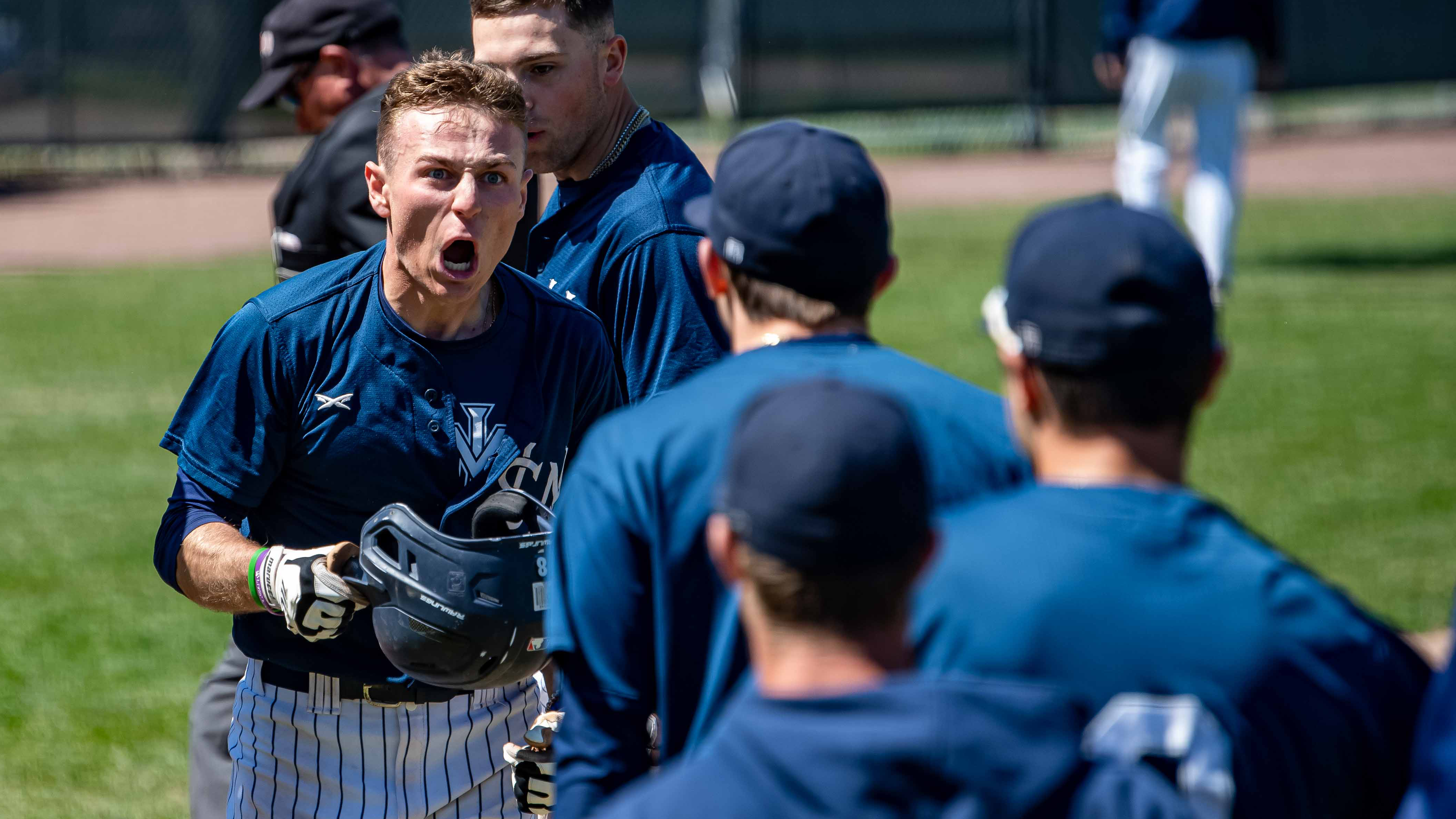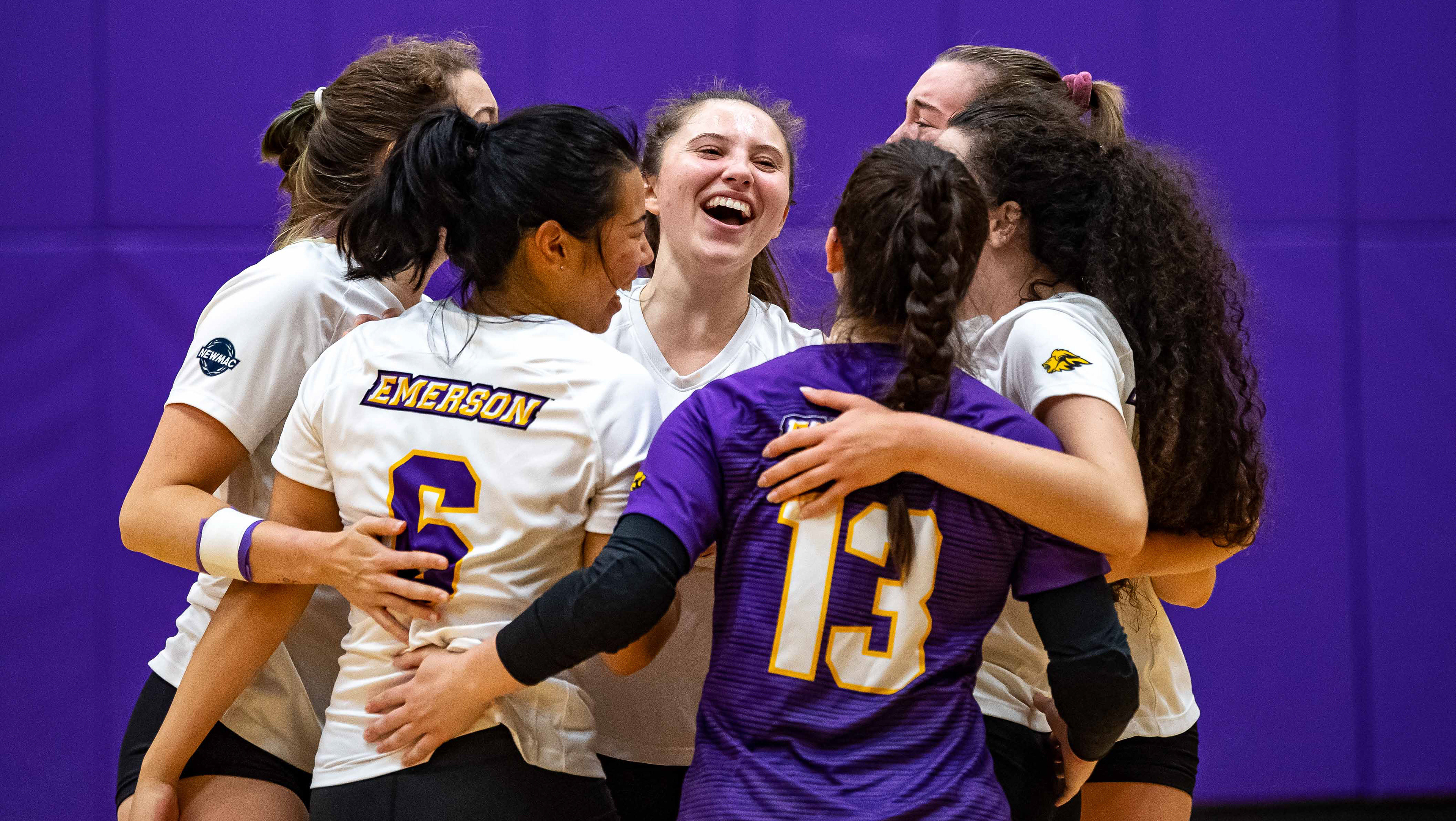Minor League Hockey Players Find Individual Solutions to Challenging Lifestyle
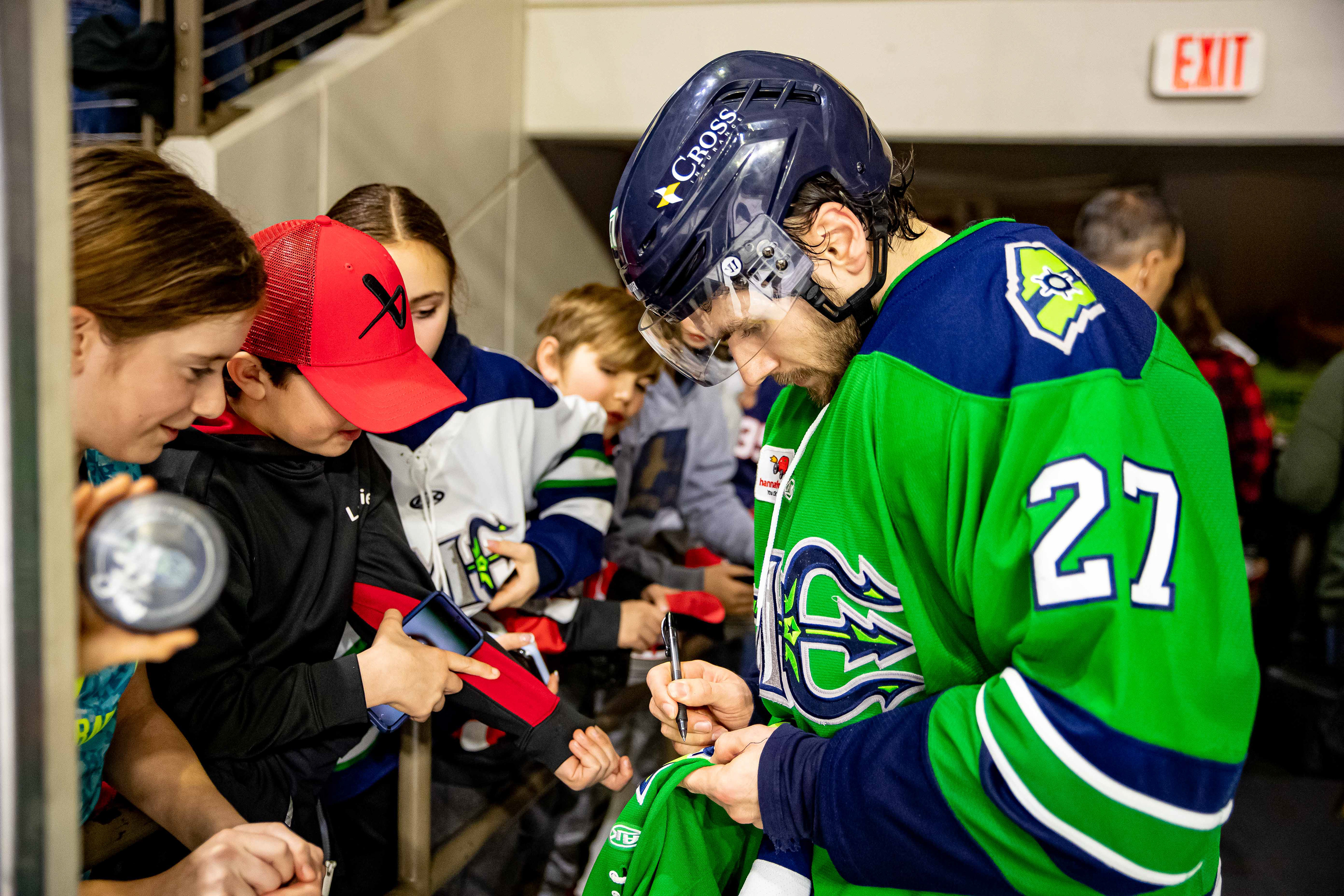
Maine Mariner Pat Shea draws a large fanbase to games with his social media stardom, including 34.2k subscribers on YouTube and 101.6k followers on TikTok.
As fans begin to flood into the Cross Insurance Arena, Pat Shea and his teammates lace up their skates in the circular locker room where the Maine Mariners logo graces the center of the floor.
He joins his teammates on the ice for the pregame warmups, taking a more serious tone than the one in his comedy skits. He watches the clock tick down to zero as the rest of his team skates off the ice, making sure to score a goal as the buzzer sounds loudly throughout the arena. Shea is always the last player off ice before the Zamboni prepares the playing surface for the puck drop.
Playing forward for the Boston Bruins ECHL affiliate, the second tier below the NHL, Shea is third on the Maine Mariners in points. With 25 goals and 29 assists in 62 games played, he has become a star in Portland, ME.
Off the ice, he has become a star of his own making, boasting a unique social media following of over 100k followers on Tiktok, 60k followers on Instagram and 30k subscribers on YouTube.
Playing in the ECHL, the flow of money doesn’t compare to the top tier of professional leagues. According to ECHL.com, the weekly salary cap for each team is $14,100 per week for the majority of the season. For a roster of 23 players, each player makes $610 per week.
“In the American Hockey League (AHL) the money flows a little more freely,” said Baron Bedesky, Director of Hockey Operations and Player Relations for the Professional Hockey Players Association (PHPA). “The ECHL is basically, for a lack of a better term, a throwback to how it used to be in the minor leagues where you have independent owners footing the bill for everything.”
The PHPA is the “certified, US National Labor Relations Board collective bargaining representative for all professional hockey players with the AHL and the ECHL,” according to PHPA.com.
For athletes in the ECHL, Bedesky says that money and injuries are the most pressing problems each season. While the PHPA works to negotiate certain benefits for players that are often afforded in the normal nine-to-five job, such as pension plans, office benefits and living conditions, there are certain aspects of the game that aren’t as easy to negotiate.
Shea is one of the many athletes in the ECHL navigating the 72-game season, living through the challenging schedule of practices, games and traveling that comes with it all. From October to as late as June, Shea and his teammates commit themselves to full-time hockey players on a salary that is much lower compared to the highest level of professional hockey.
For players that make an estimated $20-30,000 a year, getting injured can bring the end of an income. Every contract in the ECHL is a fixed, one-year deal. Playing one of the most dangerous sports means that one hit can be the end of a career.
“In the ECHL there is no league wide insurance policy, so if somebody gets hurt there’s no insurance fairy that comes down from on high and bestows money upon the players,” said Bedesky. “It’s a self funded insurance policy at the ECHL level where teams are responsible for covering all the costs associated with hockey related injuries for their players.”
Costs and money are on the thought of every player's mind at the minor league level. Even with housing stipends and additional bonuses offered by the Collective Bargaining Agreement (CBA), the athletes don’t live a luxurious life compared to their NHL counterparts, causing players to look for outside opportunities for income.
“Obviously guys can do things in the offseason, the summer months that would supplement their income and a lot of them do, they’re pretty good at hustling,” said Bedesky.
SOCIAL MEDIA STAR
For the 25-year-old University of Maine graduate who posted his first video on YouTube in 2018 titled “A Day in the Life of a College Athlete: Hockey Player,” Shea uses social media as a method for “hustling.”
Content creation has become a new form of income, with platforms such as Instagram, YouTube and Tiktok allowing users with a large following to monetize their content. The real income comes from advertising, where brands will pay these creators to advertise their latest product, according to Shopify.
One of Shea’s videos, a comedy skit titled “A Hockey Player watching the UFC Fights,” was a paid promotional video for a betting service. According to Shopify, brands should pay $3,000 per post to accounts with over 100k Tiktok followers, like Shea.
Making content wasn’t something Shea found himself doing until his junior year of college, where he was playing hockey for the University of Maine Black Bears.
“I was watching a lot of YouTube and saw other athletes having success on YouTube and gathering loyal followings from it,” he said. “So I was like ‘oh, I could do this, here’s an easy way to get into social media,’ and here’s something no hockey player has done before."
His first video, “A Day in the Life of a College Athlete: Hockey Player,” posted four years ago has totaled over 230k views and is his most popular video on YouTube.
For Shea, making videos was a way to display his authentic self and not take life too seriously.
“I naturally just always gravitated towards making them comedic,” he said. “I was just my sarcastic self in videos and trying to be relatable.”
He’s found success in making the videos, getting millions of views across his YouTube, Tiktok and Instagram. A recent skit titled “High School Hockey Player Walking Into Class,” has 2.9 million views on Tiktok.
While he has been able to make successful content across the platforms, finding time to make them while playing a full 72-game season with the Maine Mariners is a challenge.
Making the bulk of his content in the offseason, where players have four months off in the summer, he says it balances out as if he had a normal job.
“In the season we play three to four times a week and practice so I need some time to breathe,” said Shea. “It’s a lot, I go to the rink, I come home and just work on video stuff whether it’s editing, filming skits, a podcast, or a vlog.”
While the content creation lifestyle makes for a packed schedule alongside his professional hockey career, Shea makes sure to try to find a balance whenever possible to take a day off or take his mind away from it.
Along the road of making content, Shea has been successful on the ice for the Mariners. Earning a brief stint in the American Hockey League last season with the Springfield Thunderbirds, he was called up to the Providence Bruins in February for two games, notching an assist.
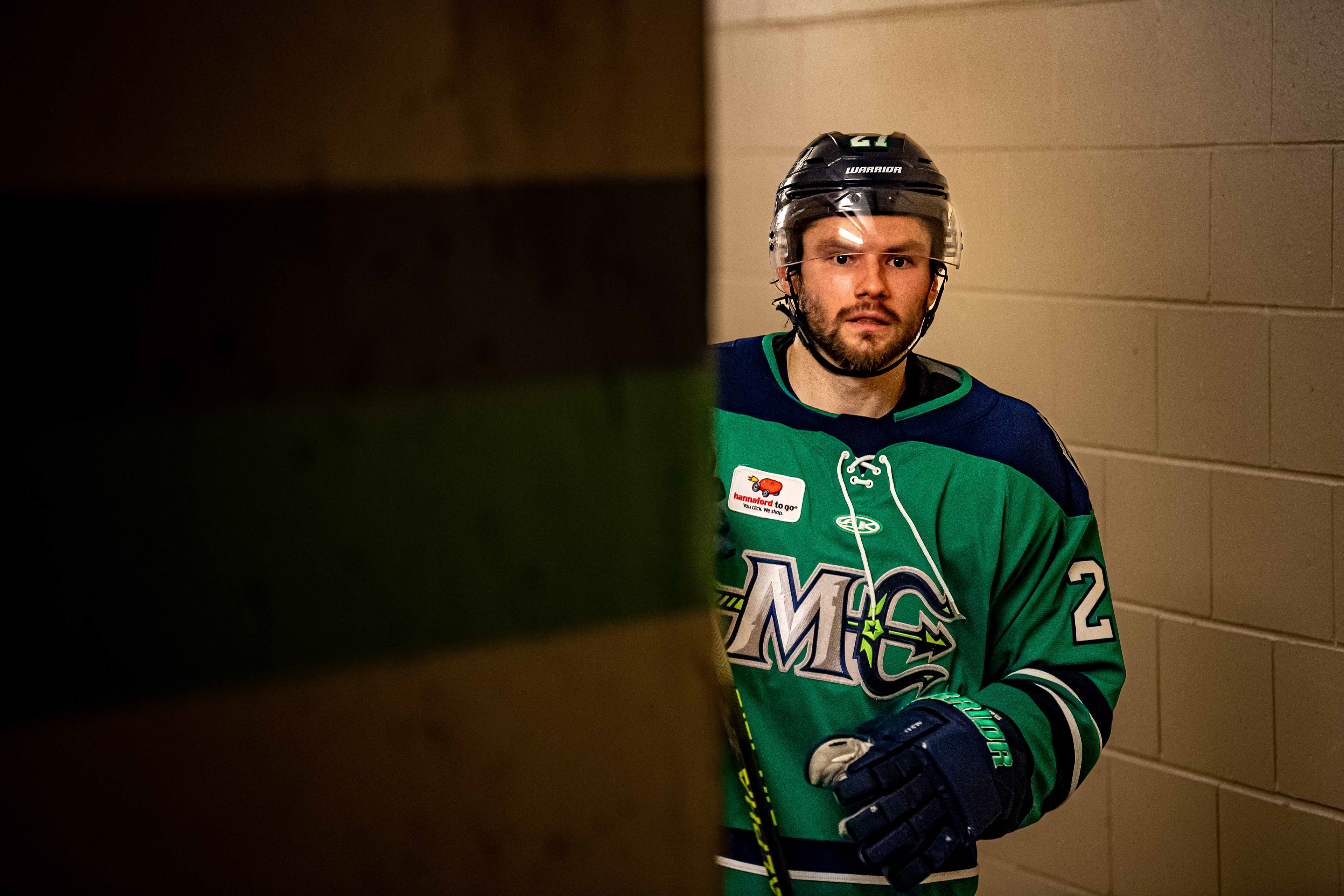
Pat Shea takes a serious tone as he takes to the ice for the Mariners, something unseen in his comedy sketches that earned his social media following.
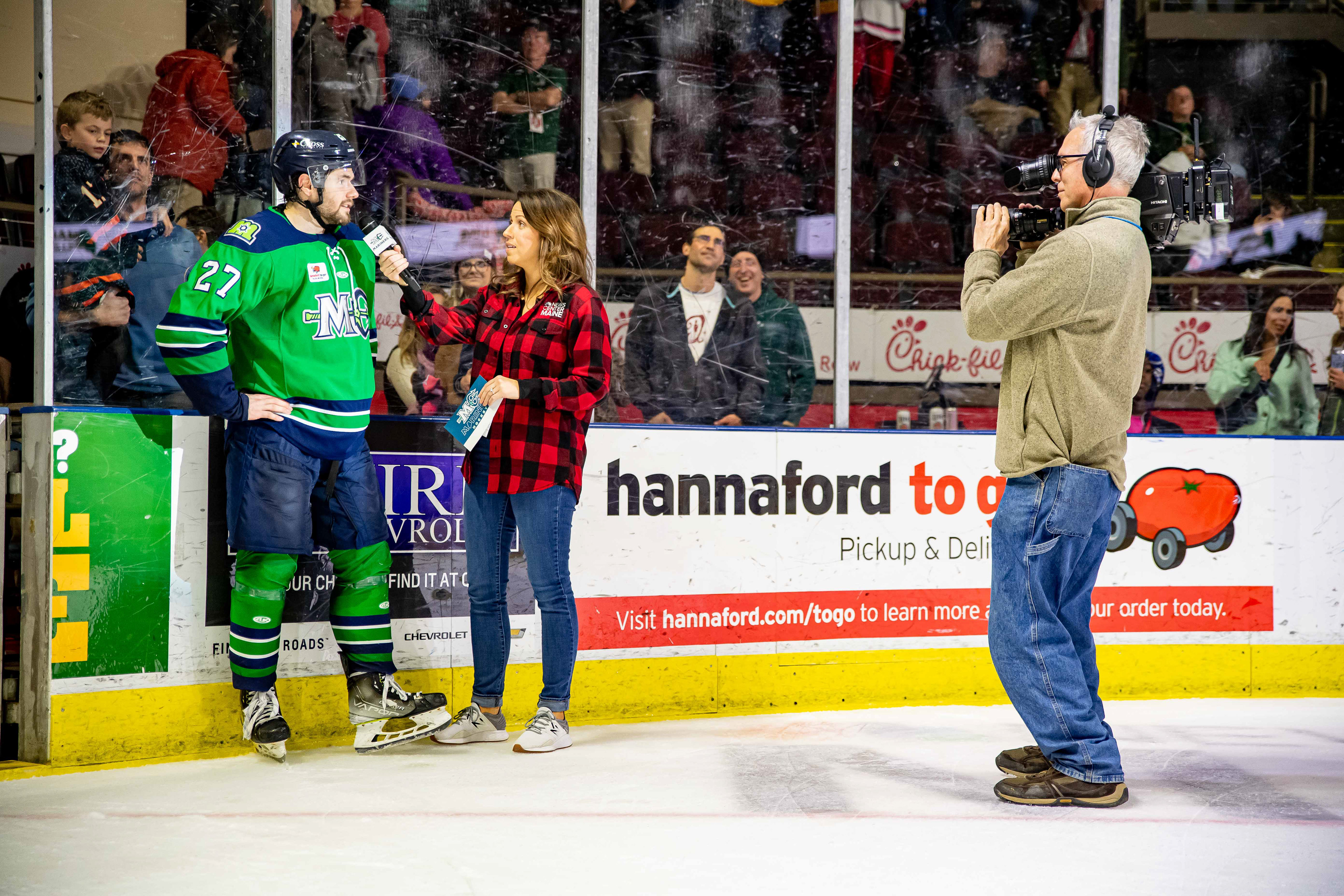
Earning first star against the Atlanta Gladiators, Pat Shea cracks jokes in his postgame interview on the ice.
Michael Keeley, Media Relations and Broadcast Manager for the Maine Mariners has witnessed it all.
“He works so hard, you can see the work he puts in and he was rewarded with another call up to Providence this year,” he said. “Last year he played some games in Springfield and I don’t think we’ve seen the last of it. For him to be in the shape he’s in it’s been amazing to watch him just fly around the ice.”
For the Mariners, Shea had an instant connection with the fans from his time at the University of Maine as well as his social media following.
“He had the UMaine connection already, so guys like him and others whenever they come here they already have an established following,” said Keeley. “Shea himself has this giant social media following so he was an instant fan favorite when he came in with the local appeal but also his following which is national on social media.”
One of Shea’s partners on the ice and another fan favorite, captain Connor Doherty, is at a different stage in his career but lives a busy lifestyle off the ice as well.
A DIFFERENT STAGE
Doherty, 29, has been in the ECHL since 2017, playing for the Mariners rival Worcester Railers for three seasons before the COVID-19 pandemic impacted the 2020-21 season.
A veteran of the league, Doherty was one of the few players to actively play in the 2020-21 season as only 14 teams participated due to the pandemic. Going into what would have been his fourth season with the Worcester Railers, the team decided they would opt out of the season.
“Once our team became free agents, there was a lot of shake up,” he said. “I feel like you would see week-to-week if someone got sick or a team was performing how they wanted they would bring in all the guys from teams that opted out.”
Doherty was added to the Kansas City Mavericks, his first time playing outside of New England. He played 40 games of their 72-game season, where they finished 31-31, not making the playoffs.
“A lot of the other leagues were shut down, so the league itself was very good and competitive,” he said. “It was really cool to be able to be part of that time when not a lot of people could play where a lot of teams were at home not able to do anything.”
Shea was one of the players that missed out on playing during the 2020-21 season. Having finished his time at the University of Maine, Shea was without a team going into the year.
“COVID happened right when I graduated so we actually had our playoffs get canceled,” he said. “I was about to sign with Worcester but then the entire north division got canceled and I ended up taking a year off from hockey.”
Shea was drafted in 2015 by the Florida Panthers in the 7th round, and coming out of the University of Maine they held his rights. Due to the pandemic, there was no professional tryout contract (PTO) available for a Panthers affiliated AHL team to play for. This left Shea without a team or contract for a year.
“It was a weird year, but I honestly think I got better at hockey,” he said. “I was able to go skate and I had the puck the whole time, where if you play on a team and you’re not in a top six role you won’t get the puck a lot.”
After the season without hockey, Shea originally signed with the Worcester Railers. With the new requirements of the vaccine, he had to wait for a period after getting the first shot to join the team. Due to a mix-up on the requirements he had to wait an extra period where the team was already getting the season started, and he was released.
“It left me thinking, do I need to retire?,” he said. “It was a very dark moment.”
It wouldn’t take long for him to get a call from former University of Maine assistant coach Ben Guite, who had taken the head coaching position at the Maine Mariners for the 2021-22 season. Playing in a men’s league on Thursday nights, he jumped at the chance to sign with the Mariners in November of that season.
Doherty also took his talents from Worcester to Portland that season. Following the 2020-21 season in Kansas City his rights went back to Worcester, but his fiancé at the time and him were moving to Maine so he asked for a trade to the Mariners.
“We had just bought a house and that meant we were going to settle down there and where we wanted to live,” he said. “I guess both coaches and teams were able to work out a trade my rights up to Maine so I could live with my wife in our house.”
Abby Doherty, his wife, has been following her husband through his hockey career for four and a half years. Throughout their journey, Connor Doherty has played for three different teams and last December, they welcomed their daughter into the world.
The couple live in Falmouth, ME where they plan to raise their family while Connor Doherty captains the Mariners a few towns over. While he spends a lot of time on the road, they have a large support system around them to help while he’s away.
“We’re super lucky to play in Maine, we’re both from New England so we both have family very close,” said Abby Doherty. “Something that is really unique in this lifestyle is having family so close.”
Working remotely, Abby Doherty also is able to travel to more away games than most to support her husband.
Along with being a new dad and the captain of the Mariners, Connor Doherty is also the PHPA representative for the team.
“That’s kind of just being a liaison between the team and the union,” he said. “They help out with our health insurance, making sure we’re taken care of on the rink, and other things like that. Usually it’s a veteran on the team that understands the CBA, health insurance and all of that to help out the younger guys.”
Terrance Wallin, the head coach of the Maine Mariners, is someone who has a deep understanding of how the league functions as he played in the ECHL for four years.
Wallin played his final two seasons for the Mariners before becoming the assistant coach under Ben Guite in 2021-22. After Guite left, he took the mantle as head coach for the current season.
“I was prepared to be Ben’s assistant coach again and I was comfortable with that, but he ended up taking the job at Bowdoin,” said Wallin. “I was acting as the interim head coach and within about 10 days I was hired as the head coach.”
In his first season Wallin has led his team to an appearance in the Kelly Cup playoffs. Something that he had a lot of experience playing in the ECHL in his time with the Adirondack Thunder before moving to Maine.
Now a coach, there are different challenges that arise than when Wallin was a center who totaled 165 points over his four years in the ECHL.
“As a player you have to take care of your body and eat the right stuff, but you still want to have fun and have a social life,” he said. “As a coach it’s much different, it’s not so much about the physical demand but the mental grind.”
As a player Wallin’s focus was on himself, but now he manages a roster of 20-25 players along with a coaching staff, equipment manager, athletic trainer and making sure the team is ready to play a 72-game season.
Among those players, Wallin has been an assistant coach and head coach while both Shea and Connor Doherty have been on the Mariners.
“This season Pat has been awesome for us,” he said. “He’s a guy that I can plug into any situation and I know he’s going to come out on top. It’s a comfort knowing as a head coach that I can stick him into any situation, and then he brings a unique element with all of his YouTube and TikTok stuff.”
Wallin and Connor Doherty played against each other while he was in Maine and Connor Doherty was in Worcester. Connor Doherty was named captain of the Mariners while Wallin was assistant coach under Guite, and he had an easy choice for captain in his first year as head coach.
“When he came to us we knew he had that leadership quality,” said Wallin. “Especially with him moving to Falmouth I think he was kind of the natural captain and he’s done a great job.”
While Connor Doherty has spent many seasons on the ice, he is grateful for the opportunity to play for as long as he has.

Connor Doherty raises his stick to his wife Abby and their daughter in the stands after a win against the Atlanta Gladiators.
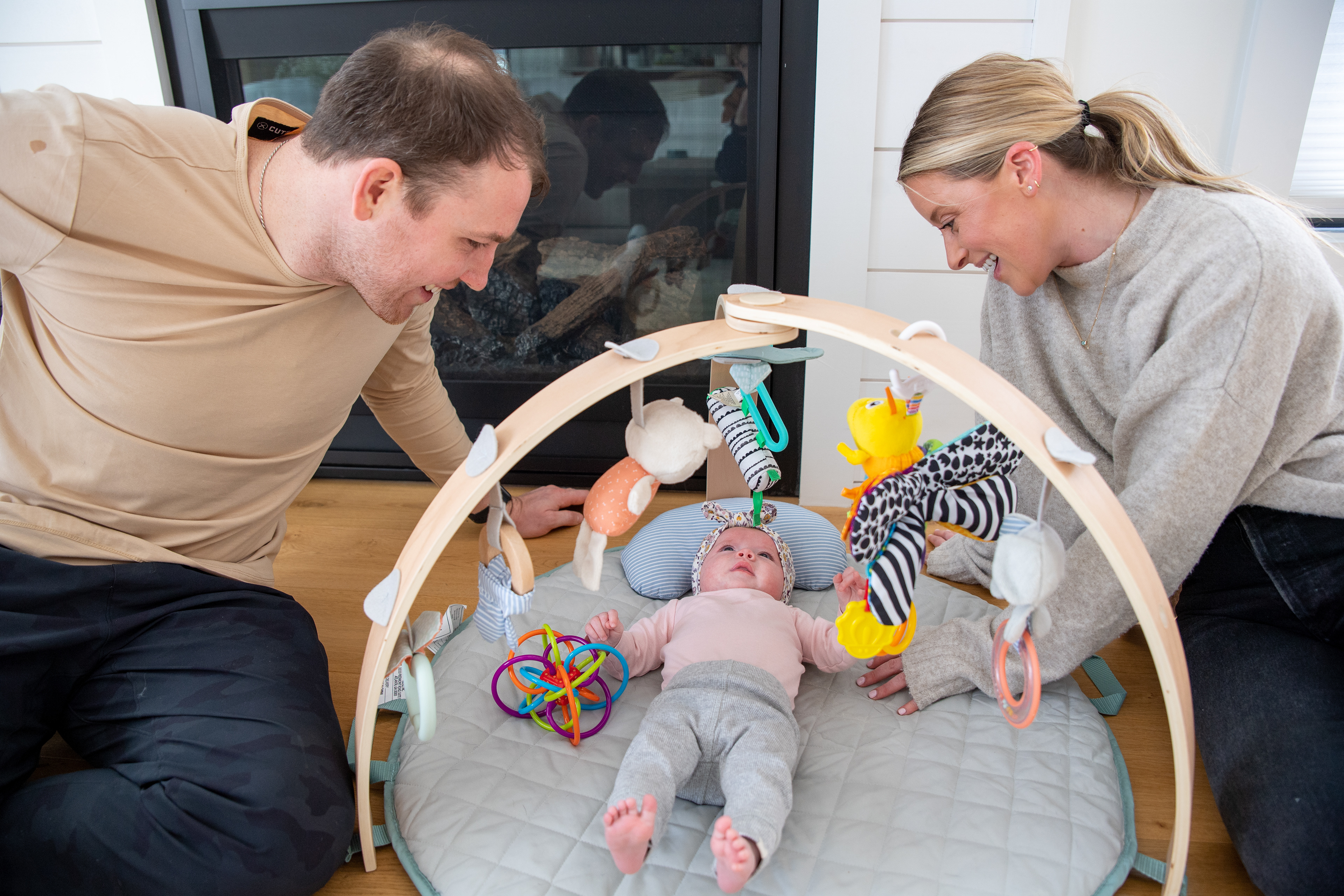
Connor and his wife Abby Doherty settled in Falmouth, ME with their daughter who joined their family in December.
“Being able to play hockey for a living is something that not many people can do no matter what level it’s in I feel like every level you get to there’s kind of a pyramid where there’s less and less people that do it,” he said. “You have to take a step back sometimes and realize the position you’re in.”
Winner of the 2019-20 ECHL Community Service Award while in Worcester, Connor Doherty has used his position as a professional hockey player to make a positive impact in the community.
“I think the biggest thing is going to the games and seeing all of the young kids who are looking up to you and being role models for them in the community is important,” he said. “At the end of the day there’s a lot more to it than just the sport, you can do good for others and make some kids or families days.”
In the summer he often finds himself taking a summer job that engrains him into the community. More recently he spent a summer as a waiter in Portland, getting recognized by a few fans.
“Every summer I find something new that gives me the flexibility to have extra income during the summer but at the same time to not have a desk job so I’m able to skate and train,” he said. “I got recognized by a few season ticket holders that would do a second glance and ask if they recognized me, something we’d laugh about but it wasn’t a regular occurrence.”
As Connor Doherty and Shea help the Mariners look for success in the Kelly Cup playoffs, they have a lot of success off the ice to be proud of as they manage the lifestyle of a minor league hockey player. From being a social media star, to being a new dad, both players are winning in their own aspects of life.
